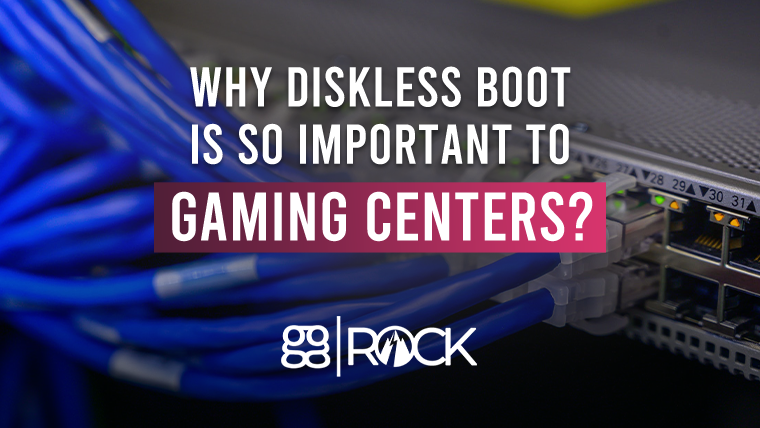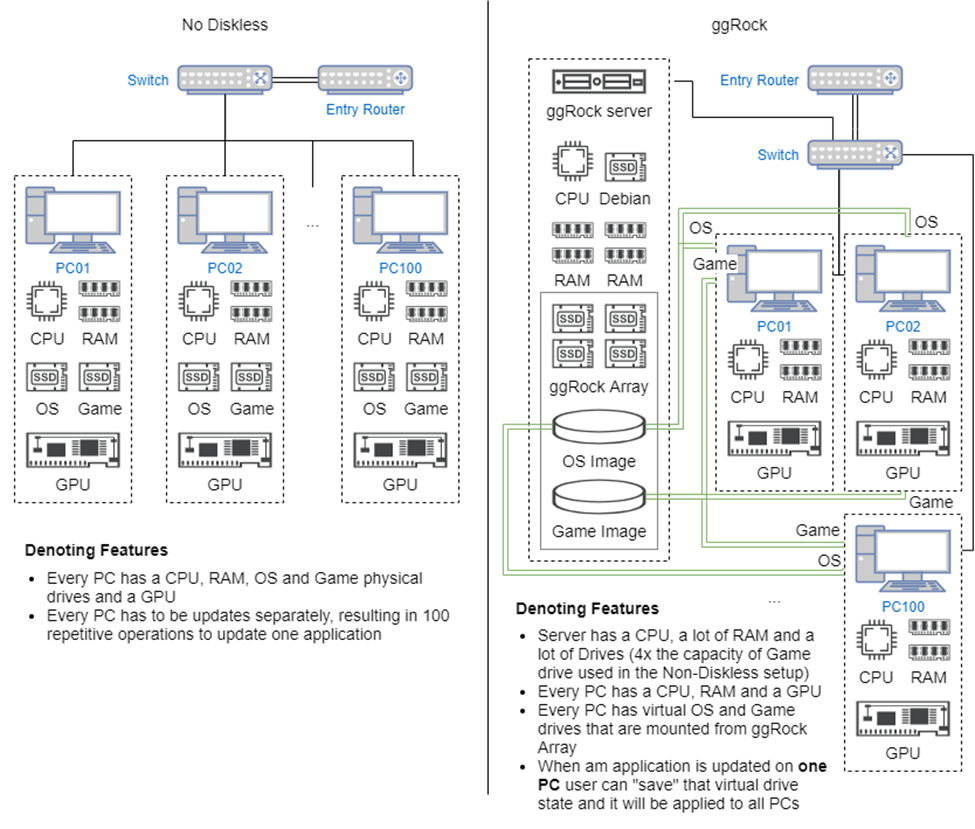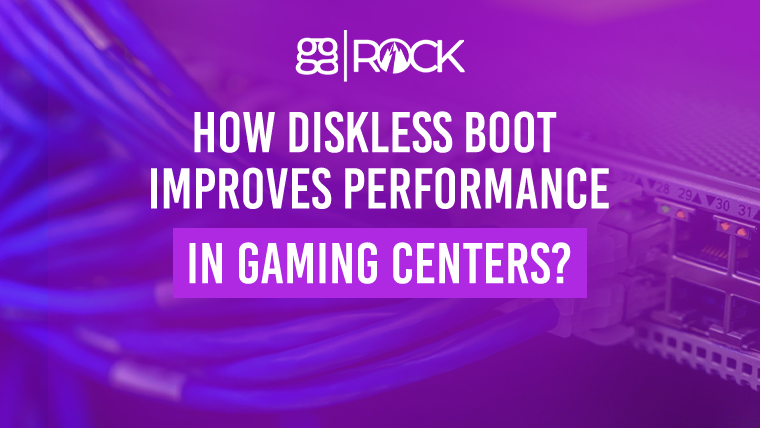Why Diskless Boot Is So Important to Gaming Centers

How many of you have faced the daunting task of installing yet another Fortnite update just mere hours before your venue opens for the day — with 40 PCs to go through? What about those huge Call of Duty updates where your ISP is utilizing massive gigabytes of downloaded game updates?
We have faced many of the same issues over the years here at ggCircuit with hundreds of our client centers. Thankfully, our team has created a superior solution for the problem — a diskless boot system called ggRock.
This article will explain ggRock and go over the fundamentals of a diskless boot system and why it is so vital for gaming centers.
 ggRock PXE diskless boot environment vs non-diskless environment
ggRock PXE diskless boot environment vs non-diskless environment
What Is a Diskless Boot System?
A diskless boot system (otherwise known as a PXE boot setup) is a computer system without hard drives. Instead, each computer uses network-attached storage drives on a server to store data. The PXE boot setup relies on client machines network booting to load the operating system and game images while still having its own processor, RAM, sound, video, and LAN adapter.
What's Different About a PXE Setup?
In a regular system (which refers to a system with local disks), the operating system and software required to perform the most fundamental functions are stored on one or more local drives.
When booting the PC, the local disk is used to load the operating system. Once the system is completely functional, the data that users can access are typically stored in the local drives as well.
With a PXE setup, you can boot computers from a set of drives located on the network server. This method allows you to store the games you install on a shared network image.
Now that all your disks are connected through one network server, you just need to update your software on one PC then reboot each PC; updates will cascade throughout the client machines.
Sign up for ggCircuit Updates!
Why Use a Diskless Setup in Your Esports Center?
Since all computers in your gaming center share the same disk drive, it will be easier to maintain the drive's good condition. You also have the option of whether or not to apply the changes made on a specific PC. This implies that any vandalism — such as the rearranging or changing of folders, removing or adding of files, or installation of viruses or keyloggers — will be erased on the next reboot.
This also means you won't have to worry about most viruses, spyware, or Trojans, and every restart will seem like a fresh install. Your computers are both safer and speedier, preserving a clean, "golden image" for your gaming center.
Benefits of PXE Solutions
Here are some of the advantages of using a diskless boot system:
- Allows you to save massive about of time on application updates: It is more efficient to install and update applications when there is just a single network image for a large number of workstations.
- Staff savings: without diskless boot you have to hire staff to do weekly game updates on each PC. ggRock and diskless boot easily saves $14,000 annually in staff costs because you update one PC and your done.
- Enjoy superior performance: It is generally faster to access data from a network server than a local storage device since PXE boot solutions employ highly efficient caching algorithms based on RAM with lower comparative latency.
- Resets computers to a clean state on every reboot, preventing vandalism: As mentioned earlier, each time you reboot your computer, it's wiped clean. This means you won't have to worry about malicious software or unauthorized changes to folders any longer.
- Saves you money on hard drives for storing large game files: Since a large-capacity disk drive is usually cheaper than numerous low-capacity drives, diskless workstations can lower total storage costs. Furthermore, since everything is stored on the server, a PXE setup can make backups and security more manageable.
- Allows you to save money on traffic: Your updates will be requiring 10x time lower downloads per center, significantly reducing your ISP bill.
Click here to test the ggLeap client!
Drawbacks of PXE Solutions
Some of the drawbacks of a PXE setup are as follows:
- Technical requirements and challenges: For diskless software to run, you'll need a standalone network server with a little more storage, RAM, and a faster CPU and networking card. You'll also have to upgrade or acquire a new server with better hardware if you plan to add a large number of PC clients.
- A diskless system makes you vulnerable to a single point of failure: All PC clients are rendered worthless and unable to boot if the network server crashes. Furthermore, if the central LAN (ethernet) cable is broken, all computer clients in the system will fail. As a result, server hardware redundancy is critical.
The Bottomline
A diskless system can provide excellent performance, centralized file and updates management, and low cost and storage requirements.
In this article, we've gone over the foundations of how a diskless boot system works, as well as its benefits and drawbacks. This type of setup has plenty of potential for making your gaming center's management and operation easier and more efficient.
If you want to learn more about diskless boot systems, get in touch with ggCircuit today! We'll gladly respond to any of your questions and concerns. Also, be sure to check out our article about what you need to know before opening an esports center.



